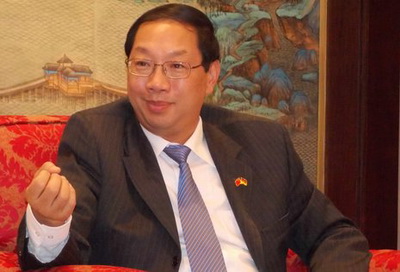Ambassador: German interest in China's reform
- By Wu Qiongjing and Chen Boyuan
 0 Comment(s)
0 Comment(s) Print
Print E-mail China.org.cn, March 10, 2014
E-mail China.org.cn, March 10, 2014
|
|
|
Shi Mingde, China's ambassador to the Federal Republic. [File photo] |
Chinese President Xi Jinping is scheduled to visit Europe, including Germany, later this month, news that has attracted attention from various social groups in the European country, said Shi Mingde, China's ambassador to the Federal Republic.
Shi, also a member of the Chinese People's Political Consultative Conference (CPPCC), said Germany would like to know what China's new president has to say regarding the development of the bilateral ties between both nations, including investment, trade and the "overall China-EU strategic partnership."
President Xi's visit will bear even more significance as it would be his first trip to Europe and Germany since assuming the present office. Likewise, Angela Merkel has recently embarked on her third consecutive term as Germany's chancellor, defying a European tradition that the gloomy economic outlook was bound to shuffle a country's top leadership.
The ambassador also noted how both countries are the world's two biggest economic entities as well as exporters. In both nations, manufacturing accounts for a large proportion of the economy.
"China's current efforts in restructuring the economy and upgrading its growth mode will require technology in energy efficiency and green economy -- sectors in which Germany takes pride. That will mean new cooperation and business opportunities," Shi said.
He added that amid China's "comprehensive deepening reforms," German companies are encouraged to expand their investment in China. Germany now represents China's largest investor as well as the country that has provided the most technology-related transfers. He added Germany's China investment grew by almost 30 percent, meaning "Germany is confident in China's future despite the impact of the financial crisis."
"For example, Volkswagen has decided to build a factory in Urumqi, and BASF, Germany's world-leading chemical company, will operate in Chongqing," said the ambassador.
According to China's Ministry of Commerce, up to 7,500 German companies -- mainly in the automobile, transport, and chemical sectors -- have invested some 40 billion euros in China.
At the same time, China's investment in Germany is also "growing exponentially," said the ambassador. More than 2,000 Chinese firms are currently operating in Germany, which has made "two way" investment a reality between both countries.
Amid the cheerful signs, the ambassador also warns of any possible protectionism stemming from Europe, which he explained as "problems pending a solution in China-European trades."







Go to Forum >>0 Comment(s)